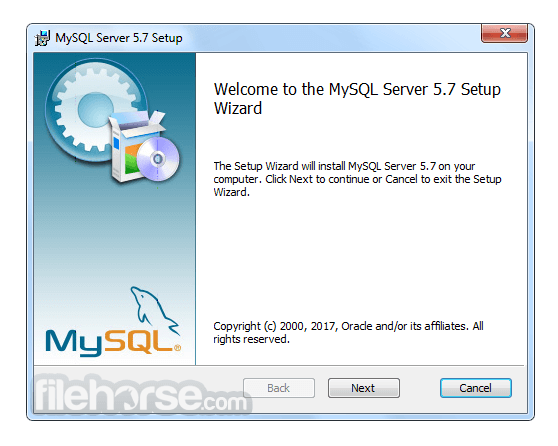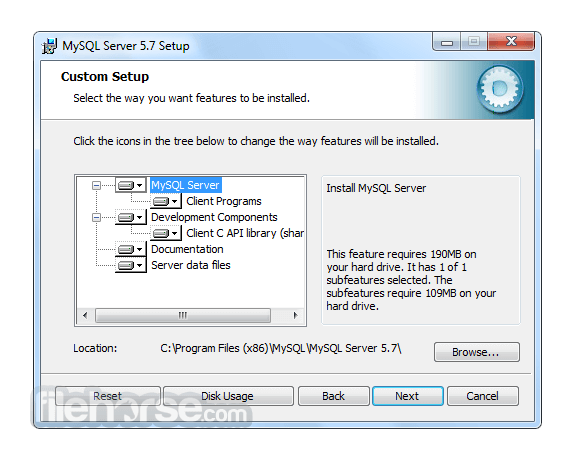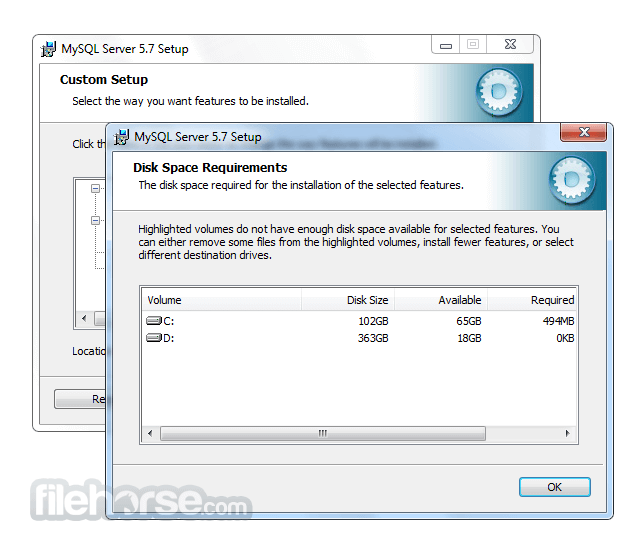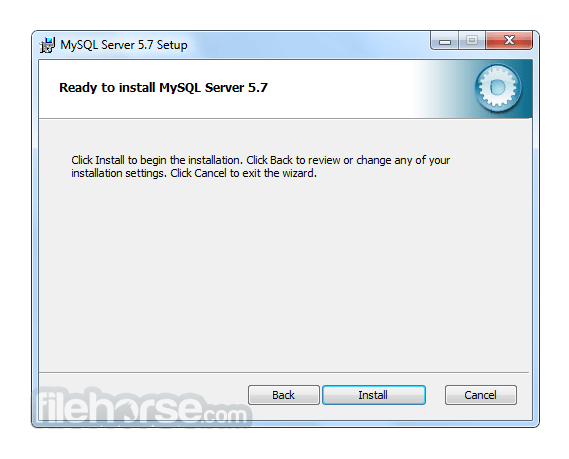-
Latest Version
-
Operating System
Windows XP64 / Vista64 / Windows 7 64 / Windows 8 64 / Windows 10 64
-
User Rating
Click to vote -
Author / Product
-
Filename
mysql-5.6.29-winx64.msi
-
MD5 Checksum
24d04a6d2f186e2ee4881074357c2187
Sometimes latest versions of the software can cause issues when installed on older devices or devices running an older version of the operating system.
Software makers usually fix these issues but it can take them some time. What you can do in the meantime is to download and install an older version of MySQL 5.6.29 (64-bit).
For those interested in downloading the most recent release of MySQL or reading our review, simply click here.
All old versions distributed on our website are completely virus-free and available for download at no cost.
We would love to hear from you
If you have any questions or ideas that you want to share with us - head over to our Contact page and let us know. We value your feedback!
What's new in this version:
Functionality Added or Changed:
- InnoDB: A new InnoDB configuration option, innodb_tmpdir, allows you to configure a separate temporary file directory for online ALTER TABLE operations. This option was introduced to help avoid tmpdir overflows that could occur as a result of large temporary files created during online ALTER TABLE operations. innodb_tmpdir is a SESSION variable and can be configured dynamically using a SET statement
- yaSSL was upgraded to version 2.3.9. This upgrade corrects an issue in which yaSSL handled only cases of zero or one leading zeros for the key agreement instead of potentially any number, which in rare cases could cause connections to fail when using DHE cipher suites
- The Valgrind function signature in mysql-test/valgrind.supp was upgraded for Valgrind 3.11
Bugs Fixed:
- InnoDB: A small InnoDB buffer pool size with a large innodb_stats_persistent_sample_pages setting resulted in a Difficult to find free blocks in the buffer pool warning
- InnoDB: Starting the server with an empty innodb_data_home_dir entry in the configuration file caused InnoDB to look for the buffer pool file in the root directory, resulting in a startup error
- InnoDB: A full-text query run under high concurrency caused a server exit due to an invalid memory access
- InnoDB: With a large innodb_sort_buffer_size setting, adding an index on an empty table performed more slowly than expected
- Replication: When DML invokes a trigger or a stored function that inserts into an AUTO_INCREMENT column, that DML has to be marked as an unsafe statement. If the tables are locked in the transaction prior to the DML statement (for example by using LOCK TABLES), then the DML statement was not being marked as an unsafe statement. The fix ensures that such DML statements are marked correctly as unsafe
- Replication: As part of the fix for Bug #16290902, when writing a DROP TEMPORARY TABLE IF EXISTS query into the binary log, the query is no longer preceded by a USE `db` statement. Instead the query uses a fully qualified table name, for example DROP TEMPORARY TABLE IF EXISTS `db`.`t1`;. This changed the application of replicate-rewrite-db filter rules, as they work only on the default database specified in a USE statement. This caused slaves to fail when the resulting CREATE TEMPORARY TABLE was applied. The fix ensures that at the time of writing a DROP TEMPORARY TABLE IF EXISTS query into the binary log, a check is made for the default database. If it exists then the query is written as USE default_db in the binary log. If a default database is not present then the query is logged with the qualified table name
- Replication: If generating a GTID for a transaction fails, the transaction is not written to the binary log but still gets committed. Although running out of GTIDs is a rare situation, if it did occur an error was written to the binary log as a sync stage error. With binlog_error_action=ABORT_SERVER, the server aborts on such an error, avoiding data inconsistency. When binlog_error_action=IGNORE_ERROR, the server continues binary logging after such an error, potentially leading to data inconsistency between the master and the slave. The fix changes the error to be correctly logged as a flush stage error
- Replication: When using --gtid-mode=on , --enforce-gtid-consistency , and --binlog-format=row, if a user defined function with multiple DROP TEMPORARY TABLE statements was executed on a master, the resulting binary log caused an error on slaves. The fix ensures that stored functions and triggers are also considered multi-statement transactions, and that when --enforce-gtid-consistency is enabled, functions with CREATE TEMPORARY TABLE or DROP TEMPORARY TABLE statements generate an ER_GTID_UNSAFE_CREATE_DROP_TEMPORARY_TABLE_IN_TRANSACTION error
- Replication: Stored procedure local variables that were used in an ALTER EVENT statement were not being replicated correctly. This was related to the fact that CALL statements are not written into the binary log. Instead each statement executed in a stored procedure is binary logged separately, with the exception that the query string is modified so that uses of stored procedure local variables are replaced with NAME_CONST('spvar_name', 'spvar-value') calls. DDL statements (which are always binary logged in statement binary log mode irrespective of the current binary log format) can also use stored procedure local variables and a clash could cause them to not be replicated correctly. The fix ensures that any stored procedure local variables used in a query are replaced with NAME_CONST(...), except for the case when it is a DML query and the binary log format is ROW
- Replication: DROP TABLE statements are regenerated by the server before being written to the binary log. If a table or database name contained a non-regular character, such as non-latin characters, the regenerated statement was using the wrong name, breaking replication. The fix ensures that in such a case the regenerated name is correctly converted back to the original character set. Also during work on this bug, it was discovered that in the rare case that a table or database name contained 64 characters, the server was throwing an assert(M_TBLLEN < 128) assertion. The assertion has been corrected to be less than or equal 128
- Replication: Irrespective of the current binlog_format setting, DDL that changes metadata on a master is always identified and written to the binary log in STATEMENT format. Such DDL could occur from event based SQL statements, such as CREATE EVENT or DROP EVENT, or transactions that had unsafe functions such as sysdate(). When binlog_format=MIXED and attempting to replicate such DDL, it was not being correctly identified and therefore was not being correctly replicated
- Inserting a token of 84 4-byte characters into a full-text index raised an assertion. The maximum token length was 84 characters up to a maximum of 252 bytes, which did not account for 4-byte characters. The maximum byte length is now 336 bytes
- If a client attempted to use an unsupported client character set (ucs2, utf16, utf32), the error message reported to the client differed for SSL and non-SSL connections
- Data corruption or a server exit could occur if a stored procedure had a variable declared as TEXT or BLOB and data was copied to that variable using SELECT ... INTO syntax from a TEXT or BLOB column
- CREATE TEMPORARY TABLE .. SELECT statements involving BIT columns that resulted in a column type redefinition could cause a server exit or an improperly created table
- Added Microsoft Visual Studio 2015 support. Changes include using the native (added in VS 2015) timespec library if it exists, renamed lfind/lsearch and timezone/tzname to avoid redefinition problems, set TMPDIR to "" by default as P_tmpdir no longer exists, deprecated std::hash_map in favor of std::unordered_map, and added Wix Toolset 3.10 support
- With character_set_server=utf16le, some values of ft_boolean_syntax could cause a server exit for full-text searches
- With LOCK TABLES in force, an attempt to open a temporary MERGE table consisting of a view in its list of tables (not the last table in the list) caused a server exit
- For certain prepared statements, the optimizer could transform join conditions such that it used a pointer to a temporary table field that was no longer available after the initial execution. Subsequent executions caused a server exit
- Repeated execution of ALTER TABLE v1 CHECK PARTITION as a prepared statement, where v1 is a view, led to a server exit
- In addition, output for some administrative operations, when they are attempted on a view, changes from “Corrupt” to “Operation failed”. These include ANALYZE TABLE, OPTIMIZE TABLE, and REPAIR TABLE, and ALTER TABLE statements that perform ANALYZE PARTITION, CHECK PARTITION, OPTIMIZE PARTITION, and REPAIR PARTITION operations
- Valgrind detected some possibly unsafe use of string functions in code used for asymmetric encryption
- SSL connections ignored any change made by passing the MYSQL_OPT_READ_TIMEOUT option to the mysql_options() C API function
- Solaris packages failed to note the dependency of the MySQL client library on the libstlport library
- Using systemd to start mysqld failed if configuration files contained multiple datadir lines. Now the last datadir line is used
- If server was started with --thread-handling=no-threads, no foreground thread was created for a client connection. The Performance Schema did not account for the possibility of no foreground threads for queries on the session_connect_attrs table, causing an assertion to be raised
- ALTER TABLE ... CONVERT TO CHARACTER SET operations that used the INPLACE algorithm were ineffective if the table contained only numeric data types. Also, such operations failed to clean up their temporary .frm file
- Heavy SHOW PROCESSLIST or SELECT ... FROM INFORMATION_SCHEMA.PROCESSLIST activity could result in the server accepting more than max_connections connections
- When used with the libmysqld embedded server, the mysql_stmt_execute() C API function failed with a malformed communication packet error, even for simple prepared statements
 OperaOpera 118.0 Build 5461.41 (64-bit)
OperaOpera 118.0 Build 5461.41 (64-bit) PC RepairPC Repair Tool 2025
PC RepairPC Repair Tool 2025 PhotoshopAdobe Photoshop CC 2025 26.5.0 (64-bit)
PhotoshopAdobe Photoshop CC 2025 26.5.0 (64-bit) OKXOKX - Buy Bitcoin or Ethereum
OKXOKX - Buy Bitcoin or Ethereum iTop VPNiTop VPN 6.4.0 - Fast, Safe & Secure
iTop VPNiTop VPN 6.4.0 - Fast, Safe & Secure Premiere ProAdobe Premiere Pro CC 2025 25.2.1
Premiere ProAdobe Premiere Pro CC 2025 25.2.1 BlueStacksBlueStacks 10.42.51.1001
BlueStacksBlueStacks 10.42.51.1001 Hero WarsHero Wars - Online Action Game
Hero WarsHero Wars - Online Action Game SemrushSemrush - Keyword Research Tool
SemrushSemrush - Keyword Research Tool LockWiperiMyFone LockWiper (Android) 5.7.2
LockWiperiMyFone LockWiper (Android) 5.7.2










Comments and User Reviews